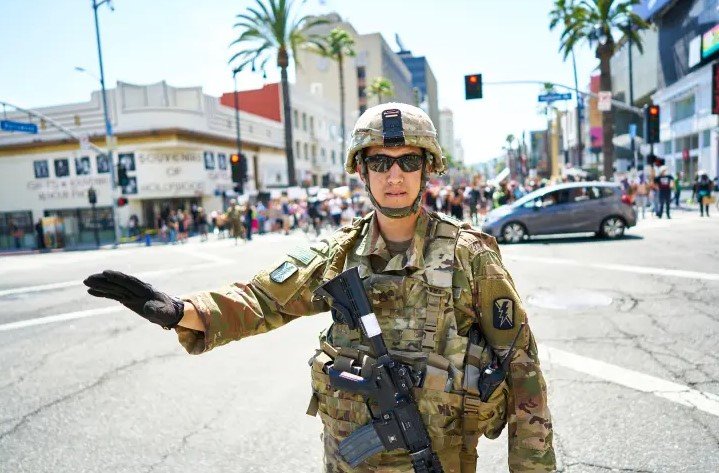President Donald Trump has launched a forceful crackdown on what he calls a “migrant invasion” in Los Angeles, deploying National Guard troops and vowing mass deportations as protests and riots rage across the city. The turmoil has entered its fourth day, with demonstrators clashing with federal agents and demanding an end to aggressive immigration raids.
Trump’s post on Truth Social early Monday set the tone: Los Angeles is “invaded and occupied” by illegal immigrants and criminals, and the city must be “liberated” from this “migrant invasion.” His hardline approach signals a sharp escalation in the federal government’s immigration enforcement, stirring controversy and deepening divisions in a city already grappling with social tensions.
A City on Edge: Four Days of Riots and Protests
The unrest in Los Angeles didn’t happen overnight. It’s the result of a recent wave of federal immigration raids that have triggered mass protests, some turning violent. Crowds gathered from City Hall to the metropolitan detention center, chanting slogans, blocking streets, and clashing with law enforcement.
The anger stems from the large-scale arrests of undocumented migrants, many of whom were living and working in the city’s sprawling communities. Activists and residents argue the raids are unjust, tearing apart families and fueling fear. Meanwhile, local officials have been caught in the middle, with some criticizing the federal actions and others demanding law and order.
Riots have resulted in damaged property, multiple injuries, and tense standoffs with police. Some residents say the situation feels like a powder keg waiting to blow — and Trump’s recent threats have only added fuel to the fire.

Trump’s Forceful Response: National Guard and Mass Deportations
In a blunt message, Trump described Los Angeles as a city under siege by “illegal aliens and criminals,” accusing violent mobs of attacking federal agents to halt deportation operations. To respond, he ordered the deployment of National Guard troops, instructing top federal officials — including Homeland Security Secretary Kristi Noem, Defense Secretary Pete Hegseth, and Attorney General Pam Bondi — to coordinate efforts and “liberate” the city.
This crackdown represents one of the most aggressive federal responses to urban unrest tied to immigration in recent years. It raises critical questions about civil rights, policing tactics, and the long-term social impact on a diverse city like Los Angeles.
The Local Impact: Communities Struggling Amid Turmoil
The human cost of this crackdown is already clear. Thousands of migrant families are facing uncertainty as arrests and deportations increase. Community leaders say the raids have fractured neighborhoods, causing fear and mistrust toward authorities.
Residents in affected areas describe a city divided:
-
Small business owners worry about losing employees and customers.
-
Parents are anxious about their children’s safety.
-
Immigrants report feeling targeted and unwelcome in the place many call home.
The city government has scrambled to address the crisis. Los Angeles Mayor’s office issued statements calling for calm and urging dialogue, but the friction between local and federal authorities remains stark.
A table below outlines some key statistics related to the recent immigration raids and their effects on the city:
| Aspect | Data/Fact |
|---|---|
| Number of arrests in raids | Over 1,200 in the past week |
| National Guard troops deployed | 1,500 personnel across multiple city sectors |
| Injuries reported | 45 people, including civilians and officers |
| Estimated number of protesters | Approximately 10,000 across multiple protests |
| Local shelters for displaced migrants | Operating at near full capacity |
The situation remains volatile, with both sides digging in for a long fight.
National Reactions and Political Fallout
Trump’s hardline stance has drawn applause from some quarters, particularly among those favoring strict immigration policies. Supporters praise the president for taking decisive action against what they call a “lawless invasion.”
However, critics accuse him of stoking fear and division. Civil rights groups have condemned the crackdown, warning it risks violating constitutional rights and worsening racial tensions.
Political leaders nationwide are weighing in. Some Republican lawmakers back Trump’s move, while many Democrats call for restraint and more humane immigration reforms.
Even within Los Angeles, opinions vary widely. The city’s diverse population includes many who view immigrants as vital to the social and economic fabric, while others express frustration over perceived lawlessness and strain on public services.
What’s Next for Los Angeles and Immigration Policy?
With the National Guard now active on the streets, the city faces an uncertain future. The question is: will these tough measures restore order, or deepen divides?
The federal government insists more deportations are coming, signaling a prolonged crackdown. Meanwhile, local organizations continue to push for dialogue, legal protections for immigrants, and long-term solutions.
The broader debate over immigration policy — balancing enforcement with human rights and community stability — is as contentious as ever. Los Angeles has become a flashpoint in this ongoing national struggle.
It’s a moment that highlights the challenges of managing a city known for its diversity, economic disparity, and complex social dynamics.
Whatever happens next, the fallout from this crackdown will likely be felt far beyond Los Angeles.
